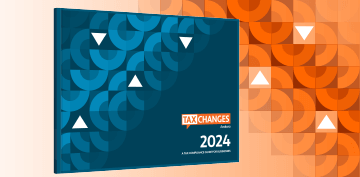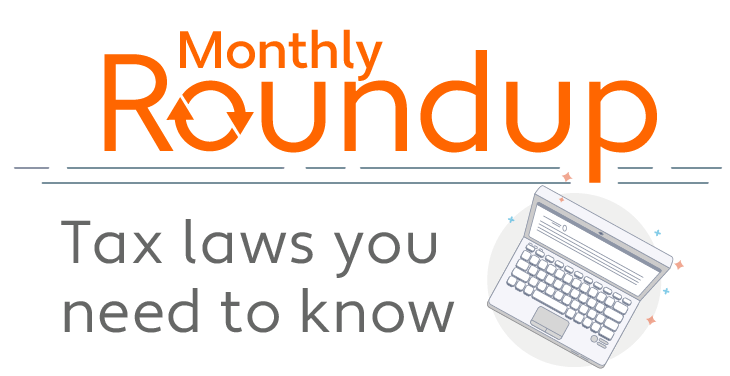
Why understanding taxability rules is key to sales tax compliance
Product taxability may seem straightforward because there are generally only two options: taxable or exempt. Yet that simple dichotomy belies the inherent complexity of sales tax compliance. In fact, it’s a multistep process that starts with determining where a business has sales tax nexus. Knowing whether the products or services one sells are taxable or exempt is critical to the compliance process, from start to finish.
Sales tax nexus
Sales tax nexus is the connection between a business and a state that enables the state to obligate the business to register then collect and remit sales tax. Once almost entirely dependent on physical presence in a state, nexus can now be based solely on an out-of-state seller’s economic activity in the state (i.e., economic nexus).
Physical presence continues to be a primary trigger for nexus. But in June 2018, the Supreme Court of the United States removed the physical presence limitation with its decision in South Dakota v. Wayfair, Inc. Economic nexus laws dropped like a row of dominoes, and today it’s enforced in 43 states, the District of Columbia, and a growing number of local jurisdictions in Alaska (where there’s no statewide sales tax). The only two states that have a general sales tax but don’t have economic nexus are Florida and Missouri, and both will likely adopt it this year.
A key component of economic nexus laws in all states (except Kansas) is the small-seller exception. To protect very small businesses from burdensome sales tax obligations in states where they don’t have physical presence, states general require a business to register only if they have a certain volume of sales or number of transactions within a certain timeframe. Examples of economic nexus thresholds include:
- $500,000 in total combined sales of tangible personal property (TPP) in the state (including exempt sales for resale) in the preceding or current calendar year — California
- 200 transactions or $100,000 in cumulative gross receipts from sales of TPP and property sold incident to a service in the state (including exempt sales of TPP but not sales for resale) in the preceding 12 months — Illinois
- 100 transactions and $500,000 in cumulative total gross receipts from sales of TPP delivered in the state (including exempt sales of TPP) in the previous four sales tax quarters — New York
To assess whether you have economic nexus with a state, you must know whether your sales in that state crossed the economic nexus threshold. That requires knowing whether your sales in that state are taxable or exempt. Understanding product taxability is key.
You also need to know the difference between statutory exemptions and circumstantial exemptions. As the names suggest, statutory exemptions were created by statute (aka, law), while circumstantial exemptions are created by the circumstances of the sale.
For example, most grocery foods like bread, fruit, and eggs are statutorily exempt from sales tax in Texas — the exemption applies regardless of the seller or the buyer. Generally taxable products like paper and pens are exempt from sales tax when sold to exempt organizations such as federal and state government entities.
Economic nexus thresholds in many states are based on gross sales, meaning exempt sales are generally included in the threshold. But that’s not always the case; as seen in the examples above, states may exclude sales for resale. From the outset, it’s important to understand which of the products or services you sell are subject to sales tax in the states where you do business.
Once you establish economic nexus with a state, you need to register with the tax department and collect sales tax as required by law. However, a state may allow remote sellers making only exempt sales in the state to forego the normal reporting cadence. For example, remote sellers that only make nontaxable retail sales in New Jersey are required to register upon reaching the economic threshold but may then request to be placed on a nonreporting basis. More state-specific details can be found in this state-by-state guide to economic nexus laws.
There’s another reason you need to know whether the goods and services you sell are taxable in states where you’re registered: so you can collect tax on all every sale that needs to be taxed. Here, too, there can be some surprising pitfalls.
Taxability pitfalls
Products are taxable in some jurisdictions but exempt in others.
Taxability rules are statewide in most states, which means if state sales tax applies to the transaction, all applicable local taxes apply as well. Or not, if the sale is exempt. However, that’s not necessarily the case in home-rule states such as Colorado and Louisiana, where local governments have the authority to administer and levy local sales taxes.
Although feminine hygiene products are subject to Colorado state sales tax, they’re exempt from the city sales tax in Denver. Yet some local taxes in Denver do apply because they’re subject to Denver’s cultural facilities tax and Regional Transportation District tax. Fun stuff.
Bundling makes an otherwise exempt transaction taxable.
When both taxable and nontaxable sales are bundled together and sold as one, like a gift basket, it’s common for states to require the seller to apply sales tax to the entire charge. Alternatively, a state may give the retailer the option of collecting and remitting tax only for the taxable portion of the bundle.
Then again, a sale that appears to be a bundled transaction may not be. For example, in New Jersey, a transaction that otherwise meets the definition of a bundled transaction isn’t one if taxability can be determined by the “true object” test (i.e., what is the true object of the transaction). In this case, the taxability of the true object reigns. Alternatively, if the taxable portion of a transaction is de minimis (i.e., the sales price of the taxable products is 10% or less of the total sales price of the bundled objects), the sales price would not be subject to sales tax.
It’s important to understand how the states where you sell tax sales with both exempt and taxable items. And it’s critical to remember that states have different rules.
Exceptions to every rule.
Most states have many, many taxability rules — and many exceptions to those rules.
For example, after sales tax was extended to sweetened beverages in Vermont, some beverages that seemed like they should be taxed were exempt, and vice versa. For example, although sales tax generally applies to sweetened iced teas, the clearly sweetened Starbucks Bottled Frappuccino is exempt.
Sales tax holidays are another special case. During limited periods of time in approximately 15 states, many normally taxable products are exempt for one reason or another. For several days each February, for example, many energy efficient products are exempt from Maryland sales tax and numerous items that can help residents weather storms are exempt from state (and in some places local) sales tax in Alabama.
Compliance doesn’t end when taxability is determined
Once you determine a product is taxable you need to apply the proper rate to each sale. Local taxes are levied on top of state sales tax in more than 35 states, and rates vary from jurisdiction to jurisdiction. There are approximately 1,500 different local tax jurisdictions in Missouri alone, and more than 1,500 jurisdictions across Texas.
Making matters more complex, sales tax rates and product taxability rules are subject to frequent change. In 2019, there were more than 34,000 rate and taxability updates in the U.S. and Canada, and more than 42,000 rate and taxability updates internationally (including the U.S. and Canada). It’s a lot for businesses to manage.
Automation can help identify which rate should apply to each product in all locations, in real time. It can enable your shopping cart to accept and track exempt sales and allow you to add new products to your catalog quickly and painlessly.
Learn more about product taxability and other issues facing ecommerce sellers.

Avalara Tax Changes 2024: Get your copy now
Stay ahead of 2024’s biggest tax changes with this comprehensive, compelling report covering seven industries.
Stay up to date
Sign up for our free newsletter and stay up to date with the latest tax news.












